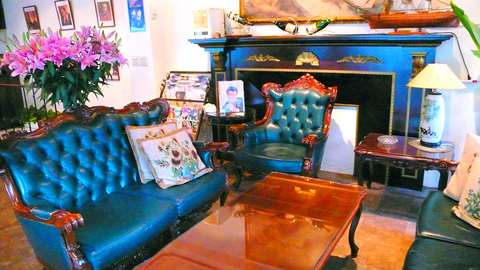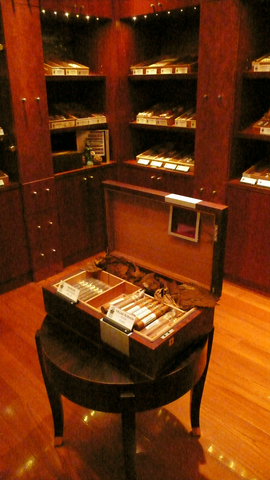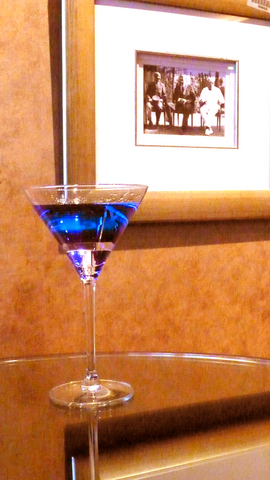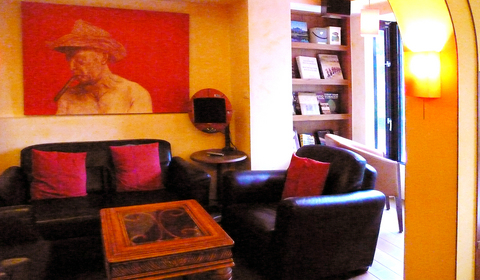Refined furnishings enveloped in soft light; jazz or classical music trickles through the smoky air. Well-dressed men sit in well-padded chairs pulling on cigars, relaxing with friends and business associates. This is the exclusive world of Taipei's cigar bars.
"A decade ago, cigars were rare and people just took anything that was available. It wasn't until six years ago, after the embargo on Cuban cigars was lifted, that people started to appreciate high quality hand-crafted products," said Kent Wu (吳慶全), a veteran cigar agent who runs the pioneering Panther (金錢豹) cigar bar on Dongfeng Street (東豐街) featuring a great variety of cigars from Cuba, Honduras, Nicaragua and the Dominican Republic.
A boom in cigar business around seven years ago, along with the fad for red wine, never lived up to expectations and the market remains a small one. To become a cigar connoisseur, a person probably needs to puff his way through two or three cigars a day, which translates into tens of thousands of NT dollars every month. Given this high financial bar, most cigar bars serve mainly as a social and recreational hub for middle-aged regulars made up of professionals and corporate executives spending after-meal leisure time puffing away at cigars from premium Cuban brands such as Cohiba, Montecristo, Romeo y Julieta, Partagas and Hoyo de Monterrey.

PHOTO: HO YI, TAIPEI TIMES
According to Wu, the prospects for this market segment are dim, as many corporate clients of this sort are relocating to China.
However, the market has changed slightly over the past three years with the introduction of lower-priced, machine-produced cigars that have made their way to supermarkets and convenience stores and appeal the young hipster eager to imitate the sophistication associated with cigar smoking.
The well-known Cigar Gallery (雪茄館) on Fuxing North Road (復興北路), for example, has witnessed the rise of a fresh crop of curious 20- and 30-somethings over the last year.

PHOTO: HO YI, TAIPEI TIMES
"Cigars used to be a thing for old guys, but now it is becoming fashionable for young people, especially foreign-educated hipsters, who gather to smoke cigars on weekends or get themselves stocked up before clubbing," said Alisa Tan (談如芬) of the Cigar Gallery, adding that lots of Americans purchase Cuban cigars to bring back home as gifts.
Besides an array of popular Cuban cigars priced from NT$200 up to NT$3,000, the Cigar Gallery also features lesser-known brands such as Cuaba and El Rey del Mundo.
Surprisingly, for cigar beginners, NT$600 to NT$1,000 [one cigar and a drink] are enough to enter the exclusive social club and mingle with a corporate elite, which still constitutes the main clientele of such establishments.

PHOTO: HO YI, TAIPEI TIMES
To Tan, cigar bars have to constantly update their way of operation to meet with the changing time and take the initiative to explore prospective customers. Though Web sites on cigars are banned by the Tobacco Control Act (菸害防治法), implemented in 1997 [ironically, the law can do nothing about cigar sales on foreign-registered portals like Yahoo], the establishment takes advantage of blogs to provide an accessible channel for sharing experiences, cigar reviews and translated articles and information.
While independent cigar bars are few and far between in town, five-star and boutique hotels offer cigar dens, such as the Churchill Jazz Cigar Bar (邱吉爾鋼琴酒吧) at the Westin Taipei (六福皇宮) on Nanjing East Road (南京東路). Accommodating around 100 people, the celebrated venue offers live jazz music performed from Tuesday to Saturdays from 9pm to 11pm. Frequented by international businesspeople, the bar in fact provides affordable entertainment with a minimum charge of NT$300 during the daytime and NT$500 at night, attracting young hipsters and show biz celebrities to indulge in Cuban cigars, good wines and creative cocktails amidst the refined decor.
Though cigars are becoming a symbol of sophistication among young hipsters, Alvin Huang (黃宜文), owner of trendy Chateau on Fuxing South Road (復興南路), said that one of the problems for people like him was the relative immaturity of the cigar market in Taiwan.

PHOTO: HO YI, TAIPEI TIMES
"Smoking cigars requires a laid-back environment and there simply aren't many such places here in Taipei," said Huang, adding that even though there are many lounge bars and nightclubs for dabblers (in cigars), there are few that will appeal to serious cigar smokers, who might not wish to mingle with a boisterous 20-something crowd.

In the March 9 edition of the Taipei Times a piece by Ninon Godefroy ran with the headine “The quiet, gentle rhythm of Taiwan.” It started with the line “Taiwan is a small, humble place. There is no Eiffel Tower, no pyramids — no singular attraction that draws the world’s attention.” I laughed out loud at that. This was out of no disrespect for the author or the piece, which made some interesting analogies and good points about how both Din Tai Fung’s and Taiwan Semiconductor Manufacturing Co’s (TSMC, 台積電) meticulous attention to detail and quality are not quite up to

April 21 to April 27 Hsieh Er’s (謝娥) political fortunes were rising fast after she got out of jail and joined the Chinese Nationalist Party (KMT) in December 1945. Not only did she hold key positions in various committees, she was elected the only woman on the Taipei City Council and headed to Nanjing in 1946 as the sole Taiwanese female representative to the National Constituent Assembly. With the support of first lady Soong May-ling (宋美齡), she started the Taipei Women’s Association and Taiwan Provincial Women’s Association, where she

Chinese Nationalist Party (KMT) Chairman Eric Chu (朱立倫) hatched a bold plan to charge forward and seize the initiative when he held a protest in front of the Taipei City Prosecutors’ Office. Though risky, because illegal, its success would help tackle at least six problems facing both himself and the KMT. What he did not see coming was Taipei Mayor Chiang Wan-an (將萬安) tripping him up out of the gate. In spite of Chu being the most consequential and successful KMT chairman since the early 2010s — arguably saving the party from financial ruin and restoring its electoral viability —

It is one of the more remarkable facts of Taiwan history that it was never occupied or claimed by any of the numerous kingdoms of southern China — Han or otherwise — that lay just across the water from it. None of their brilliant ministers ever discovered that Taiwan was a “core interest” of the state whose annexation was “inevitable.” As Paul Kua notes in an excellent monograph laying out how the Portuguese gave Taiwan the name “Formosa,” the first Europeans to express an interest in occupying Taiwan were the Spanish. Tonio Andrade in his seminal work, How Taiwan Became Chinese,